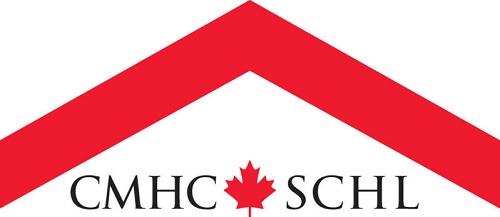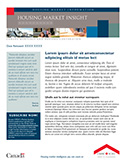 Friday, April 26, 2024
Friday, April 26, 2024  Friday, April 26, 2024
Friday, April 26, 2024 

OTTAWA, Dec. 19, 2017 /CNW/ – The share of condominium apartments owned by non-residents remains low in the 17 Canadian Census Metropolitan Areas (CMAs) surveyed, with the majority reporting shares of less than 1%. Non-resident ownership shares remained stable in Vancouver and Toronto, while Montreal saw an increase. Results are from Canada Mortgage Housing Corporation’s (CMHC) Housing Market Insight – Canada released today.
2017 Report Highlights
Share of Condominium Apartments owned by Non-Residents, 2014-2017
|
Centre |
Sub-area |
Share Owned by Non-Residents (%) |
|||||||
|
2014 |
2015 |
2016 |
2017 |
||||||
|
Calgary |
CMA |
0.2 |
a |
1.1 |
a |
0.9 |
a |
0.9 |
a |
|
Edmonton |
CMA |
0.1 |
a |
0.5 |
a |
0.3 |
a |
0.3 |
a |
|
Halifax |
CMA |
— |
— |
1.2 |
a |
1.2 |
a |
||
|
Hamilton |
CMA |
— |
** |
0.5 |
a |
0.3 |
a |
||
|
Kelowna |
CMA |
— |
0.2 |
a |
0.3 |
a |
0.6 |
a |
|
|
Kitchener |
CMA |
— |
0.2 |
a |
0.4 |
a |
0.7 |
a |
|
|
London |
CMA |
— |
2.2 |
c |
0.8 |
a |
0.4 |
a |
|
|
Montréal |
Downtown and Nun’s Island |
6.9 |
c |
4.9 |
c |
4.3 |
c |
7.6 |
c |
|
Péricentre |
1.2 |
a |
1.4 |
a |
1.5 |
b |
1.8 |
a |
|
|
West of Island of Montréal |
1.3 |
a |
0.9 |
a |
0.9 |
a |
1.5 |
b |
|
|
East of Island of Montréal |
0.8 |
a |
0.4 |
a |
0.4 |
a |
0.6 |
a |
|
|
Montréal Island |
2.3 |
a |
1.7 |
a |
1.7 |
a |
2.7 |
a |
|
|
Remainder of CMA |
0.4 |
a |
0.7 |
a |
0.4 |
a |
0.4 |
a |
|
|
Montréal CMA |
1.5 |
a |
1.3 |
a |
1.1 |
a |
1.7 |
a |
|
|
Gatineau |
CMA |
– |
0.3 |
a |
0.6 |
a |
1.1 |
a |
|
|
Ottawa |
CMA |
0.7 |
a |
1.0 |
a |
0.6 |
a |
0.7 |
a |
|
Quebec |
CMA |
0.6 |
a |
0.6 |
a |
0.5 |
a |
0.5 |
a |
|
Regina |
CMA |
0.1 |
a |
0.0 |
a |
0.2 |
a |
0.0 |
b |
|
Saskatoon |
CMA |
0.3 |
a |
0.5 |
a |
0.2 |
a |
0.4 |
a |
|
Toronto |
Centre |
4.3 |
c |
5.8 |
b |
3.5 |
b |
3.8 |
b |
|
West |
1.1 |
a |
1.5 |
a |
1.5 |
b |
1.8 |
b |
|
|
East |
1.2 |
a |
1.1 |
a |
1.3 |
a |
1.2 |
a |
|
|
North |
1.5 |
a |
2.6 |
c |
2.0 |
a |
2.9 |
b |
|
|
Toronto City |
2.7 |
a |
3.8 |
b |
2.6 |
a |
3.0 |
a |
|
|
Remainder of GTA |
1.1 |
a |
1.6 |
a |
1.4 |
a |
1.1 |
a |
|
|
Toronto GTA |
2.3 |
a |
3.2 |
b |
2.3 |
a |
2.5 |
a |
|
|
Toronto CMA |
2.4 |
a |
3.3 |
b |
2.3 |
a |
2.5 |
a |
|
|
Vancouver |
Burrard Peninsula |
5.8 |
d |
** |
5.0 |
d |
5.5 |
d |
|
|
Vancouver Westside |
1.5 |
b |
** |
2.0 |
c |
1.8 |
c |
||
|
Vancouver Eastside |
0.8 |
a |
1.0 |
a |
0.5 |
a |
0.5 |
a |
|
|
Vancouver City |
3.4 |
d |
5.4 |
d |
3.0 |
b |
3.2 |
c |
|
|
Suburban Vancouver |
2.3 |
c |
3.4 |
d |
2.3 |
c |
2.0 |
c |
|
|
Remainder of CMA |
0.6 |
a |
0.9 |
a |
1.0 |
a |
1.2 |
a |
|
|
Vancouver CMA |
2.3 |
b |
3.5 |
c |
2.2 |
b |
2.2 |
b |
|
|
Victoria |
CMA |
1.1 |
a |
1.0 |
a |
0.9 |
a |
1.1 |
a |
|
Winnipeg |
CMA |
0.1 |
b |
2.7 |
c |
0.3 |
a |
0.5 |
b |
|
The following letter codes are used to indicate the reliability of the estimates: |
||
|
a – Excellent, b- Very good, c – Good, d – Fair (Use with Caution) |
||
|
** Data suppressed to protect confidentiality or data not statistically reliable. |
||
CMHC and Statistics Canada Partnership
CMHC and Statistics Canada have combined efforts to improve housing-related data in Canada. One example of this partnership is the Canadian Housing Statistics Program (CHSP), which provides a coherent and consistent structure to measure the ownership, property and financing characteristics of the residential real estate sector in Canada.
In order to address the data gap on foreign ownership in Canadian residential real estate, CMHC began collecting information in 2014 on the non-resident share of ownership in condominiums via its Condominium Apartment Survey. CMHC has produced estimates for selected major centres, including Vancouver and Toronto. In Budget 2017, the Government of Canada provided funding to Statistics Canada to improve housing data through the CHSP. These efforts have resulted in Statistics Canada publishing its first estimates from the CHSP focusing on non-resident ownership for Vancouver and Toronto.
Quotes:
“The share of condominium apartment owned by non-residents remained low and stable in Canada. The lack of growth in Toronto and Vancouver, combined with the increases in Montréal, indicate the possibility of a shift from these centres after the introduction of foreign buyers’ taxes in Ontario and British Columbia. Other factors attracting demand to Montréal include lower housing prices and a relatively strong economy.
It should be noted that foreign ownership is just one of the factors influencing Canada’s housing markets. Other important factors include housing and land supply constraints as well as the economic and demographic fundamentals that drive housing demand.”
Bob Dugan
Chief Economist
Canada Mortgage and Housing Corporation
As Canada’s authority on housing, CMHC contributes to the stability of the housing market and financial system, provides support for Canadians in housing need, and offers objective housing research and information to Canadian governments, consumers and the housing industry.
For more information, follow us on Twitter, YouTube, LinkedIn and Facebook.